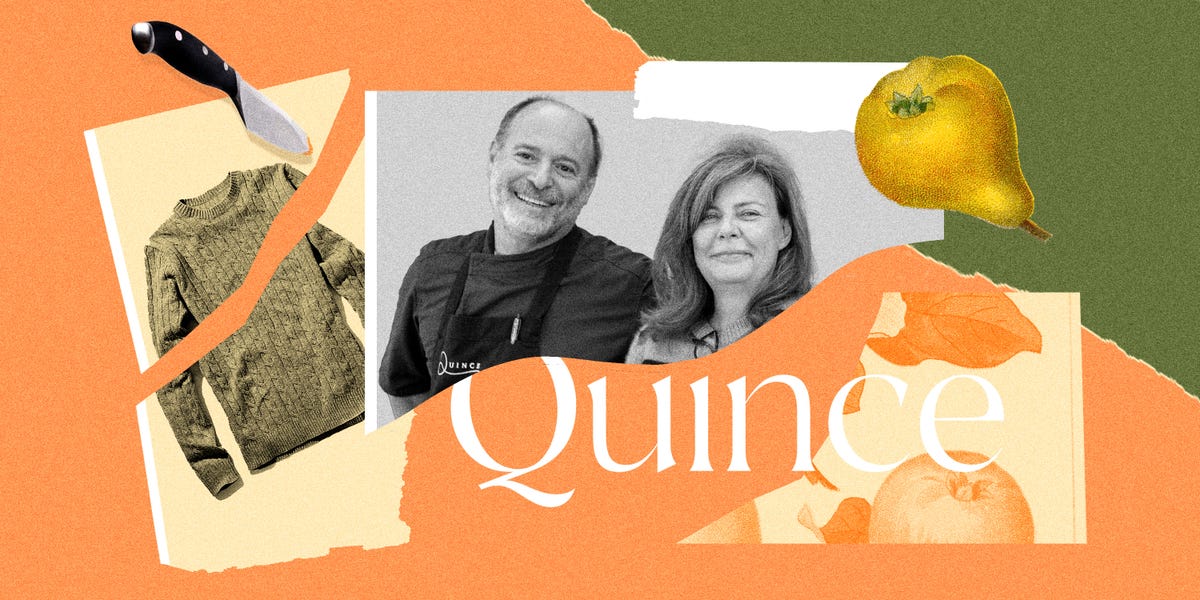When Lindsay Tusk checked her inbox in January, she felt like the wind had been knocked out of her.
She’d gotten an email from “Quince” — the name of the three-Michelin-starred restaurant she and her husband, Michael, had founded in San Francisco in 2003. It announced the launch of a line of “MICHELIN-WORTHY COOKWARE,” “Made in Italy, used in Michelin-star restaurants worldwide.” The photos of pots and knives alongside scattered tomatoes, shallots, and garlic looked as if they could have been pulled from the website of her restaurant, where a 10-course tasting menu costs $360. Even the font at the top of the email was familiar, down to the Q’s curlicue.
But Tusk’s restaurant doesn’t have a cookware line. It recently collaborated with artisan knife-maker Everett Noel on custom $470 steak knives, but those wouldn’t ship until June. When Tusk looked a bit closer, she realized that the email was from an entirely different company: a startup also named Quince best known for its inexpensive cashmere.
“It was just staggering to me,” Tusk told Business Insider. “That’s when it became quite personal. It felt like a violation.”
This wasn’t the Tusks’ first run-in with the other Quince. The Tusks say they’ve dealt with one-star Yelp reviews and Better Business Bureau complaints directed at the e-commerce brand for two years. At least 15 returns have been delivered to the restaurant from sheepskin rugs to T-shirts, the Tusks say, and confused shoppers keep calling the reservation line to ask about refunds. In December 2022, the restaurant sent a cease-and-desist letter asking the now four-year-old startup — which was originally called Last Brand Inc., a name it continues to use in some corporate filings — to stop using the name Quince. The restaurant filed a trademark-infringement lawsuit against Last Brand Inc. in November.
The startup has filed to dismiss the lawsuit, writing in its opposition brief in February that there were at least 117 businesses in the US using the name “Quince.” It acknowledged calling its cookware “Michelin-worthy” in a “single marketing email” but said it had never used the phrase in other marketing material. Sid Gupta, Quince’s cofounder and CEO, said in a declaration filed alongside the brief that it would cost more than $200 million if the company were forced to stop using the name Quince for a year, including lost sales, inventory, and expenses associated with rebranding.
“This lawsuit is meritless,” Zachary Briers, a lawyer who represents Quince.com, told BI in a statement. “The restaurant charges hundreds of dollars for lavish tasting menus, which it serves to some of San Francisco’s wealthiest residents,” Briers added. “Quince.com sells affordable sweaters and linens to online shoppers.”
Tusk told BI that Last Brand has “continuously expanded their product line smack dab into our backyard.” She and her husband took legal action because the confusion and potential for reputational damage was too great to ignore, Tusk said. Quince.com knives include a four-piece stainless-steel knife set for $49.90. The restaurant’s brass-handled steak knives earned a write-up in The New York Times Style Magazine in January. According to Tusk, her husband had been working with the upscale cookware maker Hestan on a line of copper products — a collection that would most likely be very different from what Last Brand is selling. She added that she recently discovered that Quince.com is now marketing restaurants, offering $7 off on DoorDash orders and deals on wine club memberships through partnerships.
“To have a VC-backed kind of company come in and just be the Goliath to our David — it just feels like it’s a very uneven situation,” Tusk told BI. “And that makes it even harder for us.”
Quince, the restaurant, was founded 21 years ago. The purveyor of contemporary Californian cuisine is the peak of hyperlocal fine dining in San Francisco — the type of place that offers Champagne carts and potatoes “freshly dug” from its 20-acre organic farm in Bolinas, California.
Quince, the startup, launched in 2020, also in San Francisco. It made headlines for selling $50 cashmere sweaters, along with $60 silk skirts and 14-karat-gold hoop earrings for under $100. Gupta, Quince’s CEO, has said the company cuts costs by shipping directly from the factory floor to customers’ homes. BI reported in December that the company produced garments in the same factories as its pricier competitors. In 2023, Quince raised $77 million in Series B funding, one of the industry’s largest rounds of the year.
Quince, the fruit, is tart and hard and looks like a lumpy yellow pear. The Tusks said they chose the name because “the process by which it can be eaten is long and arduous,” much like running a restaurant.
Lindsay Tusk said it had been “shocking” to see the e-commerce startup launch a cookware line three months after the restaurant filed its lawsuit.
Leslie Williamson
The e-commerce startup was originally called Last Brand. But customers found the name confusing during beta testing, Gupta said on a 2021 episode of the “Stairway to CEO” podcast. According to Gupta, the founders renamed the brand Quince in 2020 upon its official launch to play on the word quintessential, a reference to the brand selling premium essentials. But on the same “Stairway to CEO” episode, Gupta divulged another inspiration.
“Off the record, we were eating at a sister restaurant to a three-Michelin-starred restaurant named Quince in SF, and we really loved the name,” Gupta said. “And so we said, if was good enough for a three-Michelin-starred restaurant, it was good enough for us.”
As e-commerce sales exploded in the pandemic, business soared. In November 2021, Gupta said revenue had grown fifteenfold year over year. The company advertised aggressively, with big social-media pushes and a 2023 national TV campaign about its “inexpensive expensive” products. The startup now sells everything from wine glasses and electric kettles to hard-shell suitcases.
“The home business just has tremendous potential,” Gupta told the beauty publication Glossy in 2022. “Plus, it really resonated with our customer and was an easy transition.”
As the startup grew, so did mix-ups between the two brands.
A one-star review intended for the startup was posted on the restaurant’s Yelp page in December 2022, according to the restaurant’s complaint. Five Better Business Bureau complaints aimed at the startup have been mistakenly lodged against the restaurant. Even banks seem to be confused, with an online shopper calling the restaurant’s reservation line this past December after her bank listed the wrong Quince’s phone number and address on her receipt.
“If a business has the same name — this wouldn’t be the first or the last time,” Daniel Page, the restaurant’s director of operations, told BI. But, he continued, to have the restaurant’s information appear next to charges from “a completely different company is really troubling and bizarre.”
The startup dismissed the restaurant’s complaints in its opposition brief. It said that the packages were sent to the restaurant because of a “clerical error at FedEx” and that the misclassified reviews were “promptly” moved to Quince.com’s profile. Further, the startup said the logos “only appear similar because Plaintiff copied the appearance of Quince.com’s logo” in a 2023 redesign, “not the other way around.” (Tusk said the restaurant’s new logo was developed throughout the pandemic with a branding agency.) Changing the e-commerce brand’s name, the brief said, “would shut down Quince.com’s operations — imperiling hundreds of jobs, hundreds of millions of dollars in annual sales.”
“Infrequent and isolated instances” of confusion fail to justify the restaurant’s demands, the startup argued in its brief. “Quince.com markets its brand in television, newspaper, YouTube, and social media advertisements,” the brief said. “In contrast, Plaintiff’s restaurant is only in San Francisco and caters to affluent foodies.”
Part of the confusion seems to be that the companies are roughly 2 miles apart. Tusk fears the startup’s ample funding will allow it to erase her restaurant. When people Google Quince, she said, the startup dominates the first few pages of search results, confining the restaurant to “a footnote.” Page told BI that every time he opens Instagram he sees another ad for Quince clothing.
When Quince.com launched a cookware line, “it became quite personal,” Tusk said. “It felt like a violation.”
Quince.com
The Tusks sent a cease-and-desist letter to the startup in December 2022, followed by another letter in September of last year announcing that they had acquired a federal trademark registration for “Quince” in reference to catering and culinary events. Tusk said it has been “shocking” to see the e-commerce startup double down, launching a cookware line three months after the restaurant filed its lawsuit.
The restaurant isn’t the only business to accuse Last Brand of encroaching on its intellectual property. Yeti filed a lawsuit against Last Brand in 2022, saying Quince was selling an insulated cup that was too similar to its trademarked tumbler; the case was settled out of court in February of last year. Ugg’s parent company, Deckers, sued Last Brand in 2023 after Quince began selling mini boots that looked strikingly similar to Uggs. Quince denies infringing on trade dress or patents, and the case remains open.
For now, the restaurant Quince will continue to deal with confused customers. Page said one regular asked him whether they had launched a clothing brand. Tusk said she simply wanted to stop being associated with something that she could not vouch for.
“I know that we’re outmatched and all that, but it kind of left us no choice,” Tusk told BI. “What do we do?”


